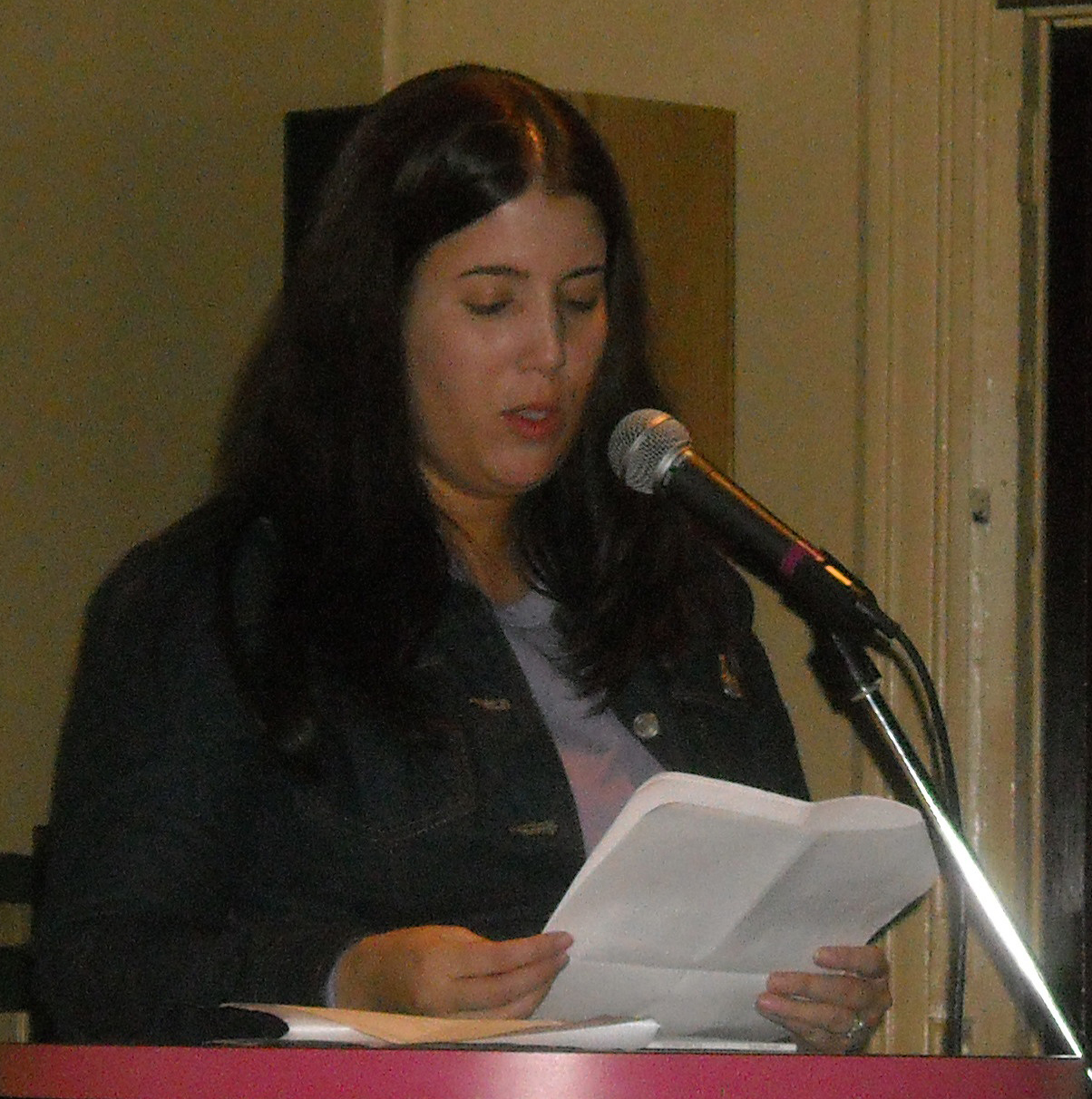One poet who won’t be boxed in

![]() By Jenny Patiño, Latina Voices
By Jenny Patiño, Latina Voices
According to Cuban-American poet Rita María Martínez, if you attend one of her readings “expecting that every poem is going to have coconuts in it, or mangos, or that every poem is going to be an exile poem then you are going to be disappointed.”
But you will be pleasantly surprised.
This November 18, 2009, Martínez was a visiting writer at the Guild Complex’s “Palabra Pura,” a bilingual monthly poetry reading in Chicago. Writers, poets, and bibliophiles alike all gathered at the Decima Musarestaurant in Pilsen amidst clanking plates, colorful paper decorations and posters of Don Quixote. In addition to a delicious dinner, attendees were treated to a diverse open mic reading and a performance by local feature poet, Puerto Rican spoken word artist Luis Tubens.
As the featured poet, Martínez was the last poet to read. Her deliberate voice and center-parted long dark hair gave her demeanor a sense of austerity that contrasted playfully with her poetry. She read mostly from her book “Jane-in-the-Box,” a revisionist romp through the lives and characters of Charlotte Brontë’s “Jane Eyre.” In these poems she takes the novel and illuminates its continued relatability by using contemporary pop references and sexually charged allusions. “Cross-Dressing,” meditates on pens, penises, and Freud through Brontë’s use of a male pseudonym Currer Bell. “Jane Eyre: Heiress, Avon Lady, Plastic Surgery Junkie” got her the most applause and laughter from the audience for her outrageousness.
Although the subjects of her poems may deviate from what is traditionally expected of Latino poetry, Martínez is very proud of her Cuban heritage. She was born and raised in Miami by Cuban immigrant parents. Neither of them was able to complete their own education and so they encouraged their only child to go to college. She is a graduate of the MFA Creative Writing Program at Florida International University.
Her father left Cuba in 1960 after the Revolution at the age of 17. He came from an affluent background where his father was a businessman and his mother was bilingual and had studied in the U.S. While it was easier for his family to adapt to their new country, it was still what Martínez considers “a rude awakening.” Rather than continue his education, her father had to work. Similarly, Martínez’s mother was pulled out of school in the 8th grade to help her family by sewing. She reached the U.S. in the early 1970s, already in her late 20s, and so had more difficulty with the language. According to Martínez, she still speaks little English and so it is difficult for them to share “books and certain literary things”.
In addition to being an internationally recognized published author, Martínez holds a position as an Academic Services Writing Tutor at Nova Southeastern University and notes on her professional website that she welcomes all ages. Being imprinted with the value of an education early on in life, she is willing to help those in her community overcome academic hurdles to success. She is currently helping her father, whom she credits with her love of language, work towards his GED.
While there weren’t any mangos, coconuts, or tales of exile in the poems Martínez read at Palabra Pura, there were bananas. She opened her reading by sharing her poem “Going Bananas” which describes the different banana trees her father has been successful at growing and the pride he takes in them. It has been published in “Burnt Sugar/ Caña Quemada,” a Cuban and Cuban-American anthology with Spanish versions of the poems. She says that being published in “Burnt Sugar/ Caña Quemada,” gave her the opportunity to have a poetry reading where her mother was able to understand.
Todd Puccio, Martínez’s husband, who is very supportive of her work was at her side in Chicago for the Palabra Pura reading. They first met at an open mic reading at their church. When asked, Puccio says that what he enjoys most about her poetry is that it is “a terrific mix of literary allusion with lightheartedness.”
Francisco Aragón also met Martínez at a poetry reading. He is the curator for the Palabra Pura series and the director of Letras Latinas at the Institute for Latino Studies at the University of Notre Dame. He and Martínez met a Palm Beach reading in February 2008 for an anthology he edited. He says that he chose Martínez to read for Palabra Pura’s last event of the year because he likes that her work “breaks the stereotypes of what someone might consider ‘Latino Poetry.’”
Like many other writers, Martínez wants to avoid the trap of what she calls “writing the ethnic ticket,” referring to when an author falls back on becoming a poster girl or poster boy for their ethnicity. Brontë used a male pen name to keep her work from being judged according to her gender. But how might a modern writer negotiate issues of race? She confides that she feels that a label like “Latina writer” can be a double edged sword. Some of her poetry deals with being Cuban-American and with her family, but there are also other poems that have nothing to do with her background. “I like Victorian novels and some of my favorite poets are females, but I’m Hispanic…am I supposed to be representing all Hispanic women?
Martínez, who writes about her obsessions, is redefining what it means to be a Latina poet in the United States. She explores shared popular culture in general rather than limiting herself to Latino issues. Currently, she is working on a series of poems inspired by super heroes. Whatever else we might have learned to expect from a “Latina writer” we can be sure that Rita María Martínez is one versatile poet who will not be boxed in.
This article was first published in Latina Voices.
Jenny Patiño is a student at Columbia College Chicago.
[Photo courtesy Latina Voices]
